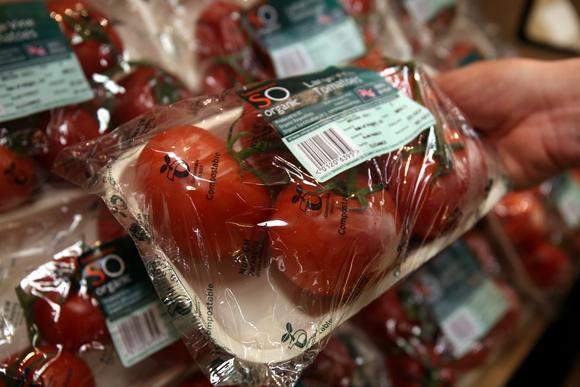
UK supermarket Sainsbury’s has signalled what it claims is “an environmental revolution” with its announcement that it is to switch, by next September, from plastic to compostable packaging for over 500 different product lines, including organic fruit, vegetables and meats and its entire own brand ready meal range.
The company claims replacing some 150m plastic trays and bags annually with compostable packaging that consumers can dispose of in domestic compost bins or heaps will cut its plastic use by 3,550 tonnes/year. (equating to a 4m tonne reduction in fossil fuel consumption). Dubbing the move a “two-pronged challenge” to other food retailers and the Government, Sainsbury’s says its customers tell it food packaging can determine what they buy.
Justin King, ceo, says: “We have already reduced excessive packaging on our Easter eggs, and made more things recyclable. We’re confident putting 500 types of our food into compostable packaging will significantly help reduce the packaging that most threatens the environment.”
King, who says he hopes other retailers will follow Sainsbury’s lead, emphasises that with some of the 500 lines switching to compostable packaging, such as organic tomatoes, “absolutely everything can be composted at home”. He adds: “In tests, most of the compostable packaging will break down quicker than a banana skin, yet it takes many years for degradable packaging or carrier bags to do the same.”
The replacement packaging will be produced from materials including maize, sugar cane and starch. By January 80% of Sainsbury’s “SO” branded organic fruit and vegetables will be in compostable packaging, with all ready meals set to switch by September. Organic sausages and whole birds will be in compostable packs by next October.
The retailer has produced packaging guidelines to encourage its suppliers to pack more foods in compostable or recyclable packaging and will also be “making packaging guidelines much clearer” on food labels, for instance with messages such as “Sorry, not recyclable” and “Please recycle”. Wherever possible it will clearly detail on packs the materials used for even individual components like labels, “so customers know exactly what can and cannot be recycled or composted”.
Sainsbury’s first “pioneered” compostable packaging in 2002, and claims to be Europe’s largest user today, as well as the UK’s biggest user of post-consumer recyclate in its packaging. In recent months it has extended its use of compostable packs for organic tomatoes to other organic goods, such as potatoes and apples, using a combination of home compostable sugar cane trays, compostable PLA punnets and home compostable flowwrap films, labels and netting.
Where it cannot use compostable material, it says it uses recyclable packaging, to date for goods including snacks, deli salads and prepared fruit.
Although it will not quantify them, the company admits the switch will entail “significant extra costs”. However these will not be passed on to customers.
Its compostable packaging suppliers to date include Natura, Amcor, Novamont and Innovia.
